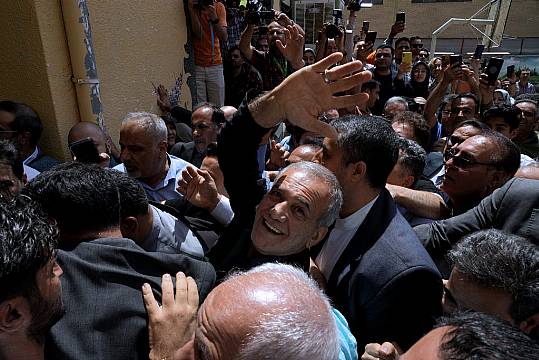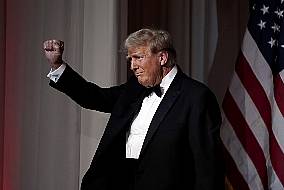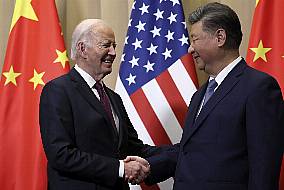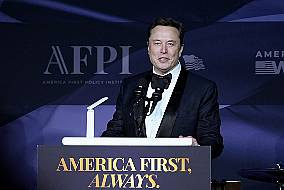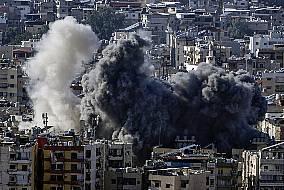Iran held a run-off presidential election on Friday, pitting a hard-line former nuclear negotiator against a reformist legislator – though both men earlier struggled to convince a sceptical public to cast ballots in the first round that saw the lowest turnout in the Islamic Republic’s history.
Government officials up to Supreme Leader Ayatollah Ali Khamenei predicted a higher participation rate as voting took place, with state television airing images of modest lines at some polling centres across the country.
However, online videos purported to show some polls empty while a survey of several dozen sites in the capital, Tehran, saw light traffic amid a heavy security presence on the streets.
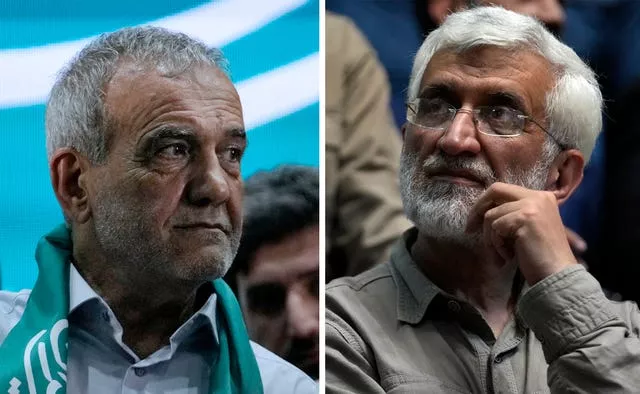
Pools closed after midnight after voting was extended, as has become tradition in Iran.
Mr Khamenei has insisted the low turnout from the first round on June 28 didn’t represent a referendum on Iran’s Shiite theocracy.
However, many remain disillusioned as Iran has been beset by years under crushing economic sanctions, bloody security force crackdowns on mass protests and tensions with the West over Tehran’s advancing nuclear programme enriching uranium closer than ever to weapons-grade levels.
“I want to save the country from isolation we are stuck in, and from lies and the violence against women because Iranian women don’t deserve to be beaten up and insulted on the street by extremists who want to destroy the country by cutting ties with big countries,” voter Ghazaal Bakhtiari said.
“We should have ties with America and powerful nations.”
The race pitted former negotiator Saeed Jalili against reformist Masoud Pezeshkian.

Mr Jalili has had a recalcitrant reputation among Western diplomats during negotiations over Iran’s nuclear programme, something that is paired with concern at home over his hard-line views on Iran’s mandatory headscarf, or hijab.
Mr Pezeshkian, a heart surgeon, has campaigned on relaxing hijab enforcement and reaching out to the West, though he too for decades has supported Mr Khamenei and Iran’s paramilitary Revolutionary Guard.
Mr Pezeshkian’s supporters have been warning Mr Jalili will bring a “Taliban”-style government into Tehran, while Mr Jalili has criticised Mr Pezeshkian for running a campaign of fear-mongering.
Both contenders voted on Friday in southern Tehran, home to many poor neighbourhoods.
Though Mr Pezeshzkian came out on top in the first round of voting on June 28, Mr Jalili has been trying to secure the votes of people who supported hard-line parliamentary speaker Mohammad Bagher Qalibaf, who came in third and later endorsed the former negotiator.
Mr Pezeshzkian offered no comments after voting, walking out with former foreign minister Mohammad Javad Zarif, who reached Iran’s 2015 nuclear deal with world powers.

A rambunctious crowd surrounded the men, shouting: “The nation’s hope comes!”
Mr Jalili voted at another poll, surrounded by a crowd shouting: “Raisi, your way continues!”
Both men hope to replace the 63-year-old late President Ebrahim Raisi died in a May 19 helicopter crash that also killed the country’s foreign minister and others.
“Today the entire world admits that it’s the people who decide who’s president for the next four years,” Mr Jalili said afterward.
“This is your right to decide which person, which path and which approach should rule the country in the next four years.”
But as has been the case since the 1979 Islamic Revolution, women and those calling for radical change have been barred from the ballot while the vote itself will have no oversight from internationally recognised monitors.

The country’s Interior Ministry, in charge of police, oversees the result.
There have been calls for a boycott, including from imprisoned Nobel Peace Prize laureate Narges Mohammadi, though potential voters in Iran appear to have made the decision not to participate last week on their own as there’s no widely accepted opposition movement operating within or outside of the country.
Mr Khamenei cast one of the election’s first votes on Friday from his residence, TV cameras and photographers capturing him dropping the ballot into the box.
He insisted those who did not vote last week weren’t boycotting the government.
“I have heard that people’s enthusiasm is more than before,“ Mr Khamenei said. “God willing, people vote and choose the best” candidate.
One voter, 27-year-old Yaghoub Mohammadi, said he voted for Mr Jalili in both rounds.
“He is clean, without depending on powerful people in the establishment,” Mr Mohammadi said. “He represents those who have no access to power.”
By Friday night, both hard-line and reformist figures urged the public to vote as lines remained light in Tehran.
“Until a few hours ago I was reluctant to vote,” said Ahmad Safari, a 55-year-old shopkeeper and father of three daughters who voted despite skipping the first round.
“But I decided to vote for Pezeshkian because of my children. Maybe they’ll have a better future.”
